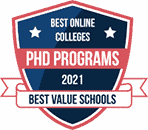
Ph.D. in Education – Educational Technology & Online Learning
Use Technology to Advance Classrooms & Your Career
Do you have the desire to facilitate improved performance through technological processes and resources, and go further too? Regent’s Doctor of Philosophy in Education – Educational Technology & Online Learning prepares you for teaching and leadership positions in K-12, higher education, or corporate learning settings. The research-based Ph.D. can prepare you more specifically for a career in academia. You can also study the principles of curriculum, instruction, assessment, and evaluation, and apply them to an online education setting.
INCREASE YOUR EARNING POTENTIAL
Capitalize on a higher salary with your Ph.D. degree.
EXPAND YOUR CAREER PATH
Take your career to the next level with exciting leadership opportunities.
MAKE AN IMPACT
Present ground-breaking research to improve the world of education. Presented from a Christian worldview, this specialty degree is supported by award-winning faculty in Virginia Beach.
ALIGN YOURSELF WITH EXCELLENCE
Regent has been ranked among Top National Universities by the U.S. News & World Report for four years (2019, 2020, 2022 and 2023). Our programs have also been ranked among the Top 10 Best Online Graduate Education Programs in Virginia for 11 years in a row (2013-2023). Our graduates are empowered to make a difference in lives, which has led to more than 850 alumni being recognized as Teachers of the Year in Hampton Roads since 2004. Experience the Regent difference through the Ph.D. in Education – Educational Technology & Online Learning program.
Please complete the Request Information form on this page to learn more about this program.
On completing the Ph.D. in Education – Educational Technology & Online Learning degree, you can:
- Explain the online learning instructional design process and practices of effective teaching and learning with technology.
- Research solutions to online-learning problems and ways to deliver research-based educational concepts or services to individuals or groups at a distance.
- Examine strategic planning and the role of program evaluation in the planning/implementation/evaluation cycle to include the curriculum planning process.
Career Opportunities
- University Faculty
- Program Director
- Technology Administrator
2024-25 Semester Check-In Deadlines
All students are expected to check-in for the semester two weeks before the session start date. Students should apply, be accepted, enroll in their first courses, and confirm a plan to pay for their courses prior to this date.
| Session | Semester Check-In | Session Start Date |
|---|---|---|
| Session A | Friday, August 9 | Monday, August 19 |
| Session M | Friday, September 6 | Monday, September 16 |
| Session B | Friday, October 11 | Monday, October 21 |
| Session C | Wednesday, January 8 | Monday, January 13 |
| Session T | Friday, January 31 | Monday, February 10 |
| Session D | Friday, March 7 | Monday, March 17 |
| Session E | Friday, May 2 | Monday, May 12 |
| Session F | Friday, June 13 | Monday, June 23 |
Admissions Requirements
Step 1: Apply to Regent University
Submit your application using the Regent University Online Application.
Note: If you are unable to complete our application due to a disability, please contact our Admissions Office at 757.352.4990 or admissions@regent.edu and an admissions representative will provide reasonable accommodations to assist you in completing the application.
Step 2: Submit Your Unofficial Transcripts
Submit your unofficial transcripts to regent.edu/items.
Upon submitting your application, you will receive an email requesting authorization for Regent University to obtain your official transcripts from your U.S. degree-granting institution. International transcripts must be evaluated by a NACES, AACRAO or NAFSA approved agency.
Step 3: Submit Your Government-Issued ID
To ensure academic integrity, Regent University requires a copy of a government-issued ID. Please submit a scanned copy or photograph of it to regent.edu/items.
Please feel free to contact the Office of Admissions at 757.352.4990 or admissions@regent.edu should you have any further questions about the application process.
Note: All items submitted as part of the application process become the property of Regent University and cannot be returned.
PART-TIME STUDENTS
| Degree | Tuition Cost Per Credit Hour | Average Credit Hours Per Semester | Average Tuition Per Semester |
|---|---|---|---|
| Master of Education (M.Ed.) | $565 | 6 | $3,390 |
| Educational Specialist (Ed.S.) | $800 | 6 | $4,800 |
| Doctor of Education (Ed.D.) | $800 | 3 | $2,400 |
| Doctor of Philosophy (Ph.D.) | $800 | 3 | $2,400 |
Full-Time Students
| Degree | Tuition Cost Per Credit Hour | Average Credit Hours Per Semester | Average Tuition Per Semester |
|---|---|---|---|
| Master of Education (M.Ed.) | $565 | 9 | $5,085 |
| Educational Specialist (Ed.S.) | $800 | 9 | $7,200 |
| Doctor of Education (Ed.D.) | $800 | 6 | $4,800 |
| Doctor of Philosophy (Ph.D.) | $800 | 6 | $4,800 |
Student Fees Per Semester
| University Services Fee (On-Campus Students) | $850 (Fall & Spring) $700 (Summer) |
| University Services Fee (Online Students) | $700 |
Part-Time Students
| Degree | Tuition Cost Per Credit Hour | Average Credit Hours Per Semester | Average Tuition Per Semester |
|---|---|---|---|
| Master of Education (M.Ed.) | $565 | 6 | $3,390 |
| Educational Specialist (Ed.S.) | $800 | 6 | $4,800 |
| Doctor of Education (Ed.D.) | $800 | 3 | $2,400 |
| Doctor of Philosophy (Ph.D.) | $800 | 3 | $2,400 |
Full-Time Students
| Degree | Tuition Cost Per Credit Hour | Average Credit Hours Per Semester | Average Tuition Per Semester |
|---|---|---|---|
| Master of Education (M.Ed.) | $565 | 9 | $5,085 |
| Educational Specialist (Ed.S.) | $800 | 9 | $7,200 |
| Doctor of Education (Ed.D.) | $800 | 6 | $4,800 |
| Doctor of Philosophy (Ph.D.) | $800 | 6 | $4,800 |
Student Fees Per Semester
| University Services Fee (On-Campus Students) | $850 (Fall & Spring) $700 (Summer) |
| University Services Fee (Online Students) | $700 |
*Rates are subject to change at any time.
Ph.D. Requirements
A Ph.D. student will (a) complete 21 hours associated with the Ed.D. core curriculum, (b) complete 24-26 hours associated with an Ed.D. concentration, (c) complete an additional 6 hours of research related credit, and (d) complete 16 hours of dissertation research credit—the total program is 67 hours. A candidate for the Ph.D. degree must present an acceptable research-based dissertation. The dissertation demonstrates that the candidate has technical competence in the field and has done research of an independent character. It must add to or modify what was previously known in the candidate’s field of interest or present a significant interpretation of the subject based upon original investigation and research.
Ph.D. students are required to take the following courses:
EDCO 806 Multivariate Statistics (3)
EHEA 805 Advanced Research Design and Analysis (3)
Faculty
Dr. Finn is the concentration chair for Educational Technology & Online Learning and is committed to your success.
Dr. Don Finn has been a faculty member since 2006 and served as the School of Education Dean from July 2015-2018. Specializing in Adult Education, he has been an educator for over 25 years and possesses a current Virginia Postgraduate Professional teaching license in secondary education.
Dr. Finn earned his B.S. in Secondary Education, Social Sciences concentration and his M.S. in Curriculum and Instruction with an Adult Education concentration from Radford University. He taught 7th through 12th grade social studies and in the adult night high school program in Montgomery County, Virginia. In 1999, he accepted a position to provide statewide leadership through the Virginia Adult Learning Resource Center located at Virginia Commonwealth University (VCU). While at the VCU School of Education, he served as a collateral faculty member, a grant and project coordinator and instructor. He earned his Ph.D. in Adult Education and Organizational Learning from VCU in 2005.
His service has included leadership at the state and national levels as president of the Virginia Association for Adult & Continuing Education (VAACE) and various appointed roles, and as an elected executive board member for the Coalition on Adult Basic Education (COABE). His COABE service includes: Secretary, Region 2 representative (2013-2015), national conference chairman (2012, 2015, 2018), conference program chairman (2016 & 2017), and President-Elect (2017-2019). He has been a textbook consultant, an article reviewer for select journals, and a consultant to adult education programs in Virginia and other states.
Finn has served on various Regent University committees including chairing the university Curriculum and Instruction Review Committee (CIRC), faculty senator, chairman of the School of Education Doctoral program and the Masters of Curriculum & Instruction (M.Ed.) program. He was named the School of Education Outstanding Faculty Member in 2010, VAACE Outstanding Adult Education Leader in 2013 and received the 2014 VAACE President’s Award for outstanding service.
Finn has authored and co-authored numerous articles and book chapters about effective instructional practices for adult learners, university professors and other diverse learners.





